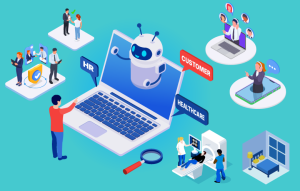Technological innovations like artificial intelligence, machine learning and deep learning are increasingly becoming the driving force for various industries. And with the world dealing with the current pandemic, AI is playing a considerable role in tackling the rapidly spreading COVID-19 pandemic, right from delivery of services, diagnosing the risk of the outbreak to drug discovery. Utilizing AI technology and advanced conversational tools, several brands, across the world, have enabled their remote workforce to work from home and yet meet the modern-day requirements of their customers. However, in this rapidly challenging environment, few companies are still struggling to make their business resilient.
“In 2019, nearly 37% of enterprises implemented AI – depicting an increase of around 270% in the past four years.”
-Gartner
In this unprecedented time, AI adoption is taking hold across businesses worldwide at a frenetic pace. However, AI becomes helpful only when implemented judiciously by subject-matter experts. But currently, many businesses are facing several distinct challenges while implementing revolutionary technologies like AI and its aforementioned subsets into their daily operations.
Hence, keeping in mind the wrestling questions of modern businesses such as ‘What are the biggest AI implementation challenges?’ and ‘How to get ready for AI implementation to grapple with the current situation?’, we have developed this befitting blog to enlighten businesses with common AI implementation mistakes and how to avoid those.
What are the mainstream AI implementation challenges for businesses?
To implement the right AI capabilities in the right way, you need to surmount several challenges associated with its implementation. The challenge is less about implementing avant-garde AI technology and more about how to implement it efficiently. For instance, it becomes difficult for businesses to map their AI opportunities and have effective strategies for sourcing the data that AI requires. Some of the most common AI implementation challenges faced by organizations, in general, are listed underneath.

Discover what, why and how of Vision AI at the Edge
Webinar agenda
- What is Vision AI at the Edge
- Why vision AI at the edge is a game-changer
- Applications of Vision AI at the Edge
- Industrial use cases for accelerating AI at the Edge
- Q & A
1. Identifying the right set of data
AI implementation begins with the right kind of data and not just any data as AI systems are developed and driven by quality data. As a variety of data flows across organizations like structured or unstructured data, it is difficult to determine which data to use and where to source it. Thus, one of the biggest challenges is identifying the set of data to improve AI systems decision making power and enrich its learning process. To assist you in identifying the right set of data, you need to connect with best-in-class AI solution providers with subject matter experts, who best encapsulates the data challenges and helps you in:
- Checking the data type that you have captured so far, either structured or unstructured
- Recognizing how to obtain high-quality data
- Categorizing every data
- Collecting and accessing those data points that can assist you to solve your business priorities and issues.
2. Data storage and security
AI applications utilize a large volume of data to learn and make intelligent decisions, which creates an issue of storage for these massive business datasets. Also, data-driven automation in every business operation creates issues related to data security, imposing legal and ethical challenges related to data breaches and privacy. Therefore, embracing the right data management environment not only enhances the security of your sensitive data but also helps you in efficiently accessing siloed data for ML and AI projects.
3. Lack of substantial infrastructure
A key challenge for most of organizations is to replace an outdated infrastructure with traditional legacy systems. AI-based solutions require a high level of computational speed. And achieving more rapid computation speed calls for high-end processors and more substantial infrastructure. As per a McKinsey report, enterprises that are taking their journey beyond the digital frontier are the ones adopting AI technology. To stay ahead of the curve and optimize AI systems’ performance, you need to think about infrastructure more broadly and deploy it on next-generation cloud platform. To help you build a flexible infrastructure and robust environment compatible with AI applications, you need to get in touch with the industry experts with the right skillsets.
4. Integration into existing systems
The integration of AI into existing systems is the most common challenge faced by almost every business or enterprise today. To ensure proper AI implementation into current systems and overcoming the potential integration challenges, your business will have to connect with the right AI vendor who has extensive AI expertise. Choosing a leading AI solutions and services provider with the right skillsets and technical know-how is the smartest move to overcome any AI integration challenges.
5. Developing and deploying complex algorithms
The performance and function of business intelligence operations profoundly rely on AI algorithms. Enterprises require to have clarity about how innovative AI technologies are going to transform their business outcomes even before scaling its applications. To overcome the challenges of complex algorithms, comprehending such algorithms will subdue the regulatory and legal challenges to the business.
6. Training and retraining AI models
After creating or implementing suitable AI-based algorithms, training and retraining AI or ML models to carry certain tasks becomes quite challenging. For the implemented model to observe its behavior/patterns and predict accurately, it becomes significant to train and further retrain these models. To achieve desired outputs, it is essential to let the right AI experts help you to train and retrain advanced data models.
7. The cost factor
Implementing AI means deploying high-performance hardware and complex software, which are quite expensive. While large enterprises have substantial budget allocations for implementing AI in their business intelligence processes, SMEs, with already stretched out budgets, find AI implementation quite challenging. However, to implement ready-to-use AI algorithms at a fair price, you will need to get in touch with the superior industry experts or AI solution providers in the market.
Stay ahead of the curve
Implementing artificial intelligence in business indeed lays a myriad of challenges. But the sagacity lies in reducing the AI implementation roadblocks and cashing in on AI technologies. To overcome these challenges and make the most of AI technology, it is prudent to take assistance from industry experts. It will result in streamlining and automating the complete business intelligence process through the formulation of an extensive AI implementation roadmap. Stay ahead of the curve by connecting with our experts to overcome the AI adoption challenges.









